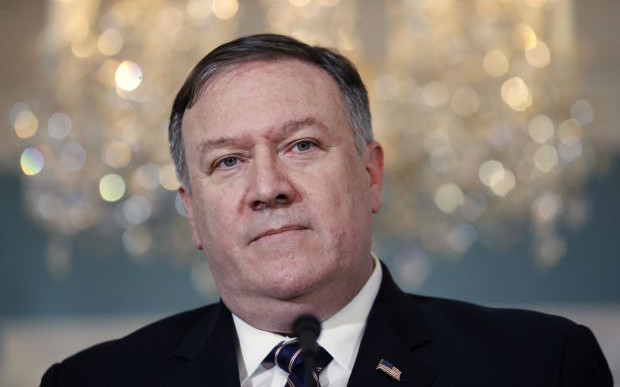24 September 2018 – On 12 September 2018, United States (US) Secretary of State Mike Pompeo certified to Congress that the Saudi Arabia- and United Arab Emirates (UAE)-led coalition in Yemen is taking “demonstrable actions to reduce the risk of harm to civilians and civilian infrastructure” resulting from the coalition’s military actions. This certification, required under Section 1290 of the John McCain National Defense Authorization Act for Fiscal Year 2019 (NDAA), clears the way for the US to continue to provide military aid to the coalition and came at the urging of one of Secretary Pompeo’s aides who is a former lobbyist for arms manufacturer Raytheon. Americans for Democracy & Human Rights in Bahrain (ADHRB) strongly condemns the certification and we are deeply concerned that it came at the behest of a former Raytheon lobbyist.
Out of serious concern over the US’ complicity in the loss of civilian life in Yemen due to ongoing arms sales and heavy logistical support to the Saudi- and Emirati-led coalition, Congress included a clause in the NDAA – the omnibus defense bill – conditioning US aid and materiél to the coalition. Under Section 1290, if the Secretary of State could not certify that the coalition was making efforts to halt the death of civilians, then by law, the US would not be able to contribute arms and support to the coalition.
These concerns by US lawmakers have since been amplified by the United Nations-appointed Group of Eminent Experts whose report identified numerous coalition actions and airstrikes that may rise to the level of war crimes due to the deaths of civilians. Recent events only add to this concern, as the 500-pound laser-guided MK-82 Paveway bomb that killed 40 children on 9 August on a school bus going on a school trip, was sold as part of a US arms deal to Saudi Arabia and was manufactured by Lockheed Martin.
While the school bus bombing sparked a particular outcry, evidence has emerged that definitively traces US-made bombs to a string of other airstrike scenes, including two airstrikes that hit a school on two separate occasions on 26 May and 9 October 2015 in which the coalition dropped a modified MK-83 bomb made by Raytheon; an airstrike on a vehicle that killed 15 members of a family, when the coalition used a GBU-12 laser-guided bomb manufactured by Raytheon; and a 22 April 2018 airstrike on a wedding, when 21 people died after a Raytheon-manufactured GBU-12 Paveway II guided bomb hit the wedding party.
Despite these repeated attacks, concerns by the United Nations over potential war crimes, and increased Congressional scrutiny over US support for the coalition’s war effort, Secretary Pompeo certified that the coalition was taking “demonstrable actions to reduce the risk of harm to civilians and civilian infrastructure.” He made this decision despite advice from policy experts in four different State Department bureaus.
Significantly, an important voice promoting certification was Acting Assistant Secretary of State, Charles Faulkner, who leads Secretary Pompeo’s legislative affairs staff and who argued, according to The Intercept that “restricting US support would endanger billions of dollars in future weapons sales, including a massive sale of precision-guided munitions between Raytheon, a US weapons manufacturer, and Saudi Arabia and the UAE.” The Intercept also reported that Faulkner is a former Raytheon lobbyist, who “before his presidential appointment last June […] was paid handsomely by Raytheon to lobby lawmakers on defense procurement issues.” At stake is a $2 billion deal between Raytheon and Saudi Arabia and the UAE for air-to-ground munitions and potentially tens of thousands of precision-guided munitions.
Husain Abdulla, Executive Director of ADHRB: “The certification decision by Secretary Pompeo is deeply disturbing given the paucity of action on the coalition’s part to investigate civilian casualties caused by airstrikes. This decision alone to not investigate wrongdoing shows the coalition is not taking any action to reduce civilian deaths. But this recent revelation is even more disturbing, and it demonstrates that the current administration is more moved by the pleas of arms dealers than by the cries of Yemenis. In effect, the Trump administration is sanctioning the slaughter of civilians for the profit of a US company. Congress must continue to press the administration to take serious action to halt US complicity with the death and suffering in the war in Yemen.”
ADHRB strongly condemns Secretary Pompeo’s certification decision and we call on Congress to continue to show leadership on this issue. We welcome the efforts led by Senators Murphy, Sanders, and Menendez, who is currently blocking arms sales to Saudi Arabia and the UAE, and by Representatives Lieu, Pocan, Khanna, and Smith who have introduced resolutions under the War Powers Act to end US support for the war. But we are deeply disappointed that the US will continue to support the war in Yemen, and we urge Secretary Pompeo to withdraw his certification and to work to end US complicity in the conflict.





